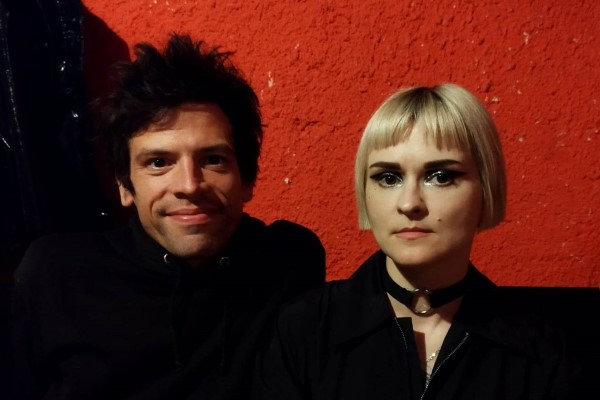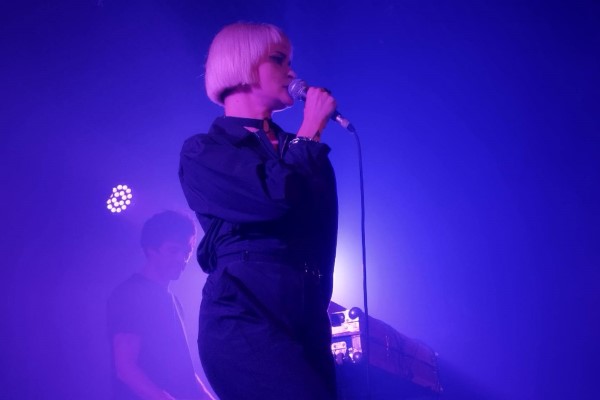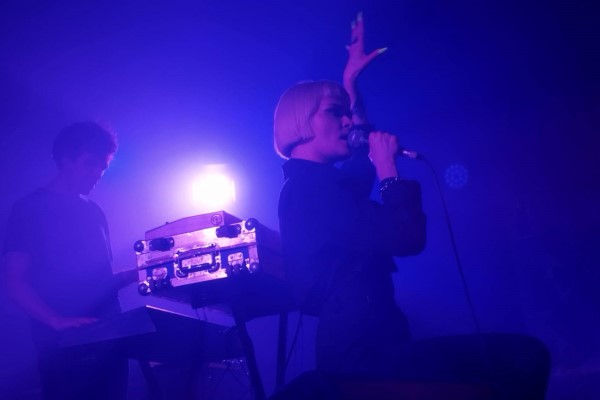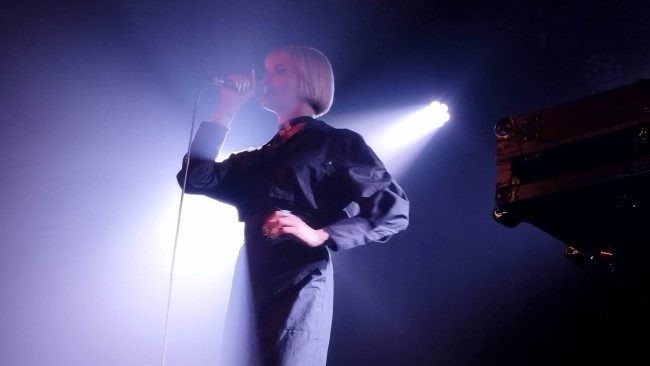
You can support Terra Relicta by donating! Please, do so, and thank you!

Barcelona, Spain-based experimental electro/minimal wave/post-punk act Fatamorgana can be counted among one of the most original acts in today's dark electro scene. The two musicians, Patrycja Proniewska and Louis Harding, perhaps better known for their post-punk band Belgrado, as a vocalist and bassist, established Fatamorgana with its experimental but dreamy and danceable music in 2017. Until now, it released two full-lengths, Terra Alta in 2019 and Ahora Aquí, Todavía No in 2022. While listening to Fatamorgana, the dreamlike synthesizers and echoed voices circle around propulsive rhythms, inviting you to simultaneously contemplate and move your body. On their recent co-headlining European tour with another Barcelona-based band SDH, we had a chance to experience them playing live in Klub Gromka in Ljubljana, Slovenia (HERE is the report), where we also conducted this interview. Now time for Fatamorgana, with Patrycja and Louis...
Interview with: Patrycja Proniewska, Louis Harding
Conducted by: Tomaz, Jerneja
Edited by: Jerneja
 Jerneja: Hello, Patrycja and Louis - pleased to meet you. It's soon time for you to occupy the stage, so let's talk fast ;) - starting with the name Fatamorgana. What's your story behind it?
Jerneja: Hello, Patrycja and Louis - pleased to meet you. It's soon time for you to occupy the stage, so let's talk fast ;) - starting with the name Fatamorgana. What's your story behind it?
Patrycja: Fatamorgana is an optical illusion. It appears over the horizon because of different layers of hot air and creates an illusion of an inverted image. I like to play with that. Also, the band's themes deal plenty with illusions, visions, emotions and landscapes. When I was a little girl, I used to perform in our living room. I did like to sing and dance for them. When I was around seven years old, I came up with the song "Fatamorgana". The song was about the caravan of camels in the desert that were moving in a circle. So, my first song was "Fatamorgana", and I thought it would be cute to name my band like this.
Louis: And I agreed with it.
Tomaz: Your latest album, Ahora Aquí, Todavía No, was released over a year ago. How do you look at it now?
Louis: It's quite a bit curious because it didn't come out only a year ago - we recorded it a year before that, so the songs are quite old. This album took us a lot of time. It was done during the pandemic when everything got stopped. There was also a long delay in getting the records done from the pressing. I thought that this feeling of waiting for such a long time would be very frustrating, but actually, we started touring again last summer. It was the first time for us to play these songs live, and it was, kind of, a new thing again. We are still quite satisfied playing these songs and will keep doing it until the next album comes out. I'm saying that for us, it still feels quite fresh. We are both also playing in Belgrado, and this last year was very much focused on Belgrado, with a brand new record that came out in April. To be honest, initially, the touring was very fun because, like I told you, the songs were for the first time played on concerts, but then, we were very focused on everything that was happening around Belgrado, so we were not thinking that much about Fatamorgana, and now it's quite fun to play them again.
Patrycja: I'm not quite sure about my feelings for the album. Last year we were touring a lot with it; we did one European tour last year. We also toured with Soft Moon. We did tours in Mexico and South America. We also did some festivals. I feel that this tour right now is some kind of closure for presenting this album to the people. We went to places we never were before, like Serbia, Romania or Bulgaria, and I think we are closing up the circle of this album now. Soon we will start working on new stuff.
 Jerneja: What did you have in mind with Ahora Aquí, Todavía No (Now, Here, Not Yet)? It sounds paradoxical...
Jerneja: What did you have in mind with Ahora Aquí, Todavía No (Now, Here, Not Yet)? It sounds paradoxical...
Patrycja: Ahhh, yes, it's also an illusion of the words. You know, in different songs, I like to talk about emotions, landscapes and memories, but sometimes I like to create a reality where reality doesn't work by the rules of reality as we perceive it. So, I like it as a paradox, and it's some kind of an allusion to the illusion. It's something I like to create in some of the lyrics.
Louis: Patrycja invented the name, but I think it's like some kind of an expression of a sensation of a feeling of an illusion. It's some kind of uncertainty of reality.
Jerneja: And what about the idea behind the title of your first album, Terra Alta?
Louis: Well, Terra Alta is a specific place in Spain.
Patrycja: Terra Alta is a place in Spain, a four-hour drive south of Barcelona. We went there with our synths to compose some of the songs. I felt very inspired by that place. For example, "Espacio Profundo" was written there. I got very impacted by nature, and I felt some kind of a magnetic connection with the place, so we decided to call the album Terra Alta. But, in the album, it doesn't mean a geographical place. When I was writing the lyrics for that album, the name Terra Alta would be more like some kind of imaginary land where minutes turn into hours, when things are possible in this time where reality can't happen. Your dreams can't work exactly like reality works. Terra Alta is also a place where stars are so close that you can touch them - at least, that's what people from there say. It's amazing! I remember being there at the full moon. The moon was like a theatrical light, creating all those shadows.
 Jerneja: You use different languages in your lyrics. English, Spanish, Polish...
Jerneja: You use different languages in your lyrics. English, Spanish, Polish...
Patrycja: Ok, I'm a Polish woman who lives in Barcelona. Every day I speak Spanish and Catalan. I speak in English to Louis and Polish with my family on the phone. So, it's a supernatural thing. But, for example, Terra Alta has lyrics all in Spanish, apart from one song, which Louis wrote as a birthday present for me, and we decided to make it a Fatamorgana song. Fatamorgana started with me strictly singing in Spanish because in Belgrado, I mostly sing in Polish, and I wanted to do it differently. I like the sound and rhythm of the Spanish language. On the second record, without any special thinking, and because we communicate in English, some songs in English came up. It was natural. I didn't plan that, and there is one song, an exception, I made in Polish. In the future, I'll lean more toward the Spanish language, but I don't want to close myself strictly on that. The moment when I hear the music and then when I write the lyrics, it often happens without thinking rationally - just like some kind of a stream consciousness idea, sometimes some notes and then I maybe polish it. My identity in Barcelona is very multi-lingual - so it's natural.
Jerneja: I guess you understand the Slovenian language also since we can - to a certain point - understand Polish.
Patrycja: Yeah, we are Slavic people, and our language base is similar. I don't think I could run a conversation in Slovenian, but I'm sure if nobody spoke English, Slovenian and Polish people could communicate pretty well. I need to practice some of it tonight ;).
Tomaz: In your videos and while playing live, you move in a very original way. How did you come up with such body moves?
Patrycja: They just come out. I guess it's a mix of how my body reacts to the music in an irrational way, and then there's a rational part where I somehow try, with my gesture, to visualize the lyrics. You know, because we sing in many languages and play in many countries, and, obviously, not everybody can understand the lyrics. I try to do gestures that are a visualization of the lyrics. Another thing is that I used to be a dancer, and I tried to dance for many years. Ok, they didn't teach me these moves but classical moves. So I make my fusion, and this is what it comes out.
 Tomaz: You said you were already working on new songs - so when can we expect to hear something new from Fatamorgana?
Tomaz: You said you were already working on new songs - so when can we expect to hear something new from Fatamorgana?
Louis: That's a good question. We were quite frustrated about how long it took to release the last album, so we think the next songs will come more quickly. Just digitally as singles. I've been making quite a lot of music at home but nothing as Fatamorgana yet.
Patrycja: After the summer, we will focus more on new music. Now we are in the process of searching. We are not in a hurry since we don't have any deadlines. Especially now that we are very busy with Belgrado. And when we finish this tour, we will go for another with Belgrado in Mexico and South America, so basically, until September, we will not be able to make anything new. Then I believe we will go more to "home rhythm". I can't make music when I'm all the time on tour. I need to have time. When I compose new music, I need to give 100 percent, and I don't want to get distracted. So, after the summer, we will see.
Louis: Yeah, hopefully, we will make some new music then, and I think we will have some new releases next year.
Jerneja: Since we are in the festival season - do you have any festival performances arranged?
Louis: Only one in Sweden.
Patrycja: Yes, because we are all of July touring in South America with Belgrado, while in August, Louis is busy with other stuff. We have one very special electronic music festival, and I think people should know about it. It's called Kalabalik på Tyrolen. It's a Swedish festival in a town called Alvesta. It's in a beautiful location. A bohemian thing; there are some kind of circus tents - it's the sixties very dreamy location. The festival is in the middle of the Swedish countryside. The festival is not well known, but we played there a few years ago with Belgrado, and it was wonderful. I recommend checking it out. In September, we will play at the Static Shock festival in London, but that's not with Fatamorgana but with Belgrado.
 Tomaz: What is more important to you - Fatamorgana or Belgrado?
Tomaz: What is more important to you - Fatamorgana or Belgrado?
Patrycja: Oh, they are both very important. The two bands give me different things. Fatamorgana started when Belgrado was a little bit in hibernation. I love both equally. I love making music; I love to perform, and each of these two bands gives me a different thing.
Jerneja: When you get an idea, do you exactly know, already in the beginning, whether is Fatamorgana or Belgrado's material?
Louis: That's a really good question!
Patrycja: We are making it differently, but there's one song of Belgrado on the new album that we did write for Fatamorgana.
Louis: We didn't write it exactly for Fatamorgana; it's just that the main idea came for it. The song is called "Elementy Umysłu".
Patrycja: We recorded it at home, and Louis made it as thinking of Fatamorgana, but straight ahead, I told him that this is a song for Belgrado. There's actually no rule.
Louis: It's quite easy because in Belgrado, I only play the bass guitar, and in Fatamorgana, I play all the synthesizers. So, the way that we make the songs is very different.
Tomaz: Thank you for taking the time for the interview. I know you're already in a hurry with the performance, but is there something you would like to share for the end?
Louis: Are you interviewing us? Haha... Thank you very much!
Patrycja: Thank you so much for the interview. I would like to say that in Ljubljana last year, in July, we played on Monday, like today, and it was one of the best shows of the tour. We hope to come back soon, and now, let's go and play!
Photos by: Tomaz
Fatamorgana links: Facebook, Bandcamp
Belgrado links: Facebook, Instagram, Bandcamp
